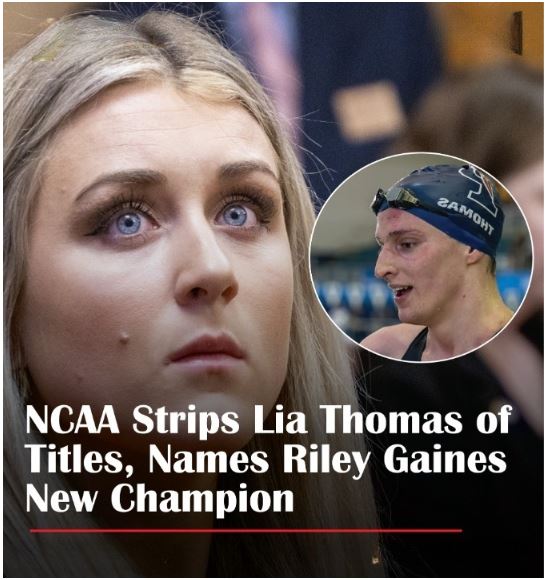The world of collegiate swimming has been rocked by a seismic event: the NCAA’s decision to strip Lia Thomas of her titles following a controversial ban. Thomas, a transgender athlete who has been at the center of heated debates regarding fairness in women’s sports, has now lost all her accolades after a landmark ruling. This decision has sent shockwaves through the swimming community and sparked intense debates on gender, inclusion, and athletic competition. As the dust settles, one name is emerging from the chaos: Riley Gaines, a rising star poised to take over the titles once held by Thomas.
The NCAA’s decision came after months of mounting pressure from various organizations, athletes, and advocates who argued that Thomas had an unfair advantage due to her biological sex. Lia Thomas had made history by becoming the first transgender woman to win an NCAA swimming championship in 2022, a feat that brought both admiration and criticism. Her victories, particularly in women’s events, sparked an ongoing debate about the role of transgender athletes in sports, with many claiming that her participation created an uneven playing field.
The controversial ruling has now stripped Thomas of all her previous titles, creating a vacuum in the women’s swimming landscape that is being swiftly filled by Riley Gaines, an up-and-coming swimmer who had previously competed against Thomas. Gaines, who had narrowly missed out on titles during her college career, now finds herself in the spotlight, inheriting the accolades that were once Thomas’s.
This decision by the NCAA has ignited a fresh wave of controversy. Supporters of the ruling argue that it restores fairness to women’s sports, where biological differences between men and women can significantly impact performance. They contend that the integrity of women’s sports must be preserved and that allowing athletes like Thomas to compete undermines decades of progress toward gender equality in athletics.
Opponents, however, view the NCAA’s move as a step backward for transgender inclusion. They argue that excluding transgender athletes from competition or stripping them of their achievements sets a dangerous precedent that could roll back hard-won rights for LGBTQ+ athletes. Many see the ruling as discriminatory, believing it unfairly targets Thomas and other transgender athletes.
The debate is far from over. Athletes, advocacy groups, and even lawmakers are weighing in, with some calling for more comprehensive policies that balance inclusion with competitive fairness. The NCAA’s decision has not only affected Thomas but has also reverberated across other sports, with some predicting that similar rulings may soon follow in other collegiate and professional leagues.
Riley Gaines: A New Champion Emerges
Amid the chaos and controversy, Riley Gaines has become an unexpected beneficiary of the NCAA’s decision. Gaines, a standout swimmer from the University of Kentucky, has long been recognized as one of the top female swimmers in the NCAA. She competed in the same events as Lia Thomas and often finished just behind her, narrowly missing out on titles that could have been hers.
Now, with the NCAA’s decision, Gaines has officially been awarded the titles that once eluded her. The shift in fortune has thrust Gaines into the national spotlight, making her not only a champion but also a symbol of the changing landscape of women’s swimming. While Gaines has expressed pride in her accomplishments, she has also acknowledged the complexities surrounding the NCAA’s ruling, emphasizing that the situation goes beyond just one swimmer’s success.
In interviews, Gaines has expressed her hope that the sport can move forward in a way that respects both competitive fairness and the inclusion of all athletes. She has become a vocal advocate for maintaining the integrity of women’s sports while also calling for more clarity in policies surrounding transgender athletes. Gaines’s measured approach has earned her respect from both sides of the debate, even as she steps into a role she never expected to occupy.
